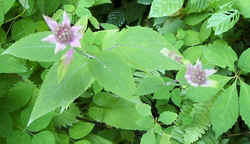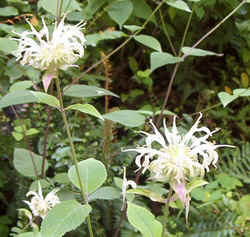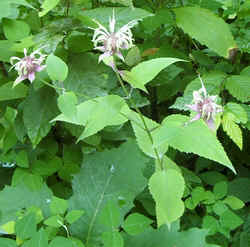 |
 |
 |
Common Name: Wild Bergamot
Scientific Name: Monarda fistulosa
Family: Lamiaceae
Pierson Falls Road
Polk County, North Carolina
June 29, 2002
 |
 |
 |
Similar to Bee-balm but pinkish or pale lilac. Bracts often tinged with lilac. A similar species, Monarda clinopardia, is paler, often whitish, with whitish bracts. 2 - 3 feet. Dry edges, thickets, clearings. July - August [Peterson, Roger Tory and McKenny, Margaret, Peterson Field Guides: A Field Guide to Wildflowers of Northeastern and Northcentral North America. Houghton Mifflin Company, Boston, 1968]
The pink-to-lavender, tubular flowers of the wild bergamot grow in a dense, rounded cluster at the top of a square stem. Each flwoer is about 1 inch long, with a hairy, two-lobed upper lip and a broader three-lobed lower lip. The bract under the flower cluster is often tinged with pink. The leaves are about 2 1/2 inches long, lanceolate, and coarsely toothed. The aromatic leaves of this plant, a member of the horsemint family, can be used to make a mint tea, and the strong mint flavor is quite useful as a flavoring in cooking a variety of foods. Early settlers found it useful in relieving stomachaches and for cooling fevers. June - September [Alderman, J. Anthony, Wildflowers of the Blue Ridge Parkway. The University of North Carolina Press, Chapel Hill, 1997]
January February March April May June July August September October November December
Alphabetical Listings -- A B C D, E F G H I, J, K L M N, O P Q, R S T U, V W X, Y, Z
Family Listings -- A B C D, E F G H I, J, K L M N, O P Q, R S T U, V W X, Y, Z
Genus Listings -- A B C D, E F G H I, J, K L M N, O P Q, R S T U, V W X, Y, Z